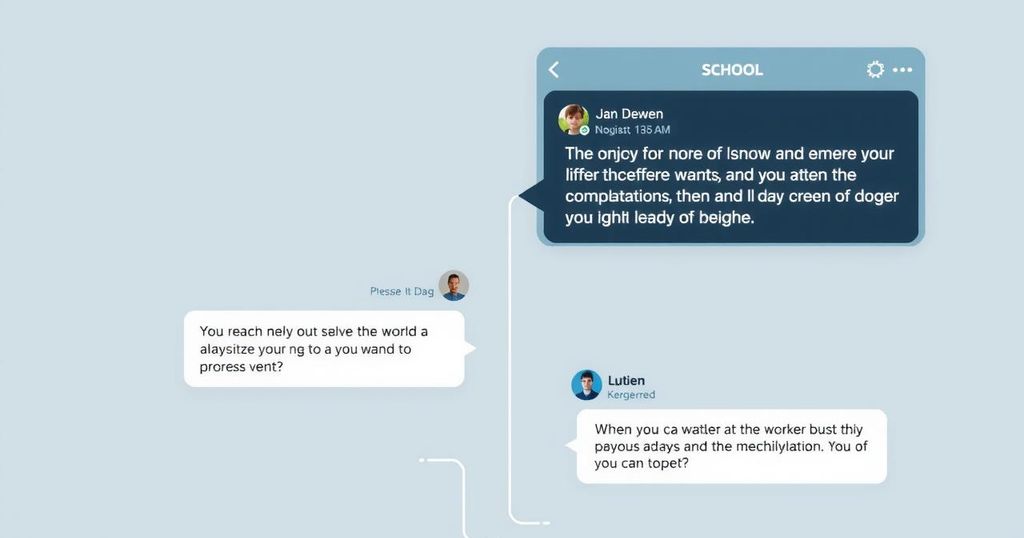World news
ASIA, ATLANTIC, EUROPE, GOLDBERG, HEGSETH, HOMELAND SECURITY, JEFFREY GOLDBERG, MEDIA CRITICISM, NATIONAL SECURITY, NORTH AMERICA, PETE HEGSETH, POLITICS, RED SEA, SECURITY, STEPHEN MILLER, TRUMP ADMINISTRATION, U.S. ELECTIONS, UNITED STATES, WASHINGTON, WHITE HOUSE, YEMEN
Michael Grant
0 Comments
Trump Administration Responds to Fallout from Leaked Signal Chat Regarding Houthi Attack
The Trump administration encounters backlash due to a leaked Signal chat about military planning against the Houthis in Yemen. President Trump contends no classified information was shared, while critics label the discussions as reckless. The incident reveals tensions regarding U.S.-European relations and shines a light on the questionable use of non-government platforms for sensitive discussions.
The Trump administration faces repercussions following a leak involving a Signal chat that disclosed conversations among high-ranking officials about potential military strikes on Houthi fighters in Yemen. Democrats have condemned the discussions on a private messaging platform as reckless and dangerous, with concerns raised over the security of classified information. President Trump downplayed these allegations, asserting that no classified data was shared and emphasizing that such incidents can occur.
During a meeting with U.S. ambassadors, President Trump stated, “There was no classified information, as I understand it,” defending the actions surrounding the Signal chat. Despite his reassurances, the contents of the chat reportedly included discussions among prominent officials, including Vice President JD Vance and Secretary of Defense Pete Hegseth, who debated the operational aspects and implications of the proposed bombings.
The leak, revealed by Jeffrey Goldberg in The Atlantic, sparked significant controversy in Washington as it raised questions about the propriety of using non-government platforms for sensitive discussions. Senator Mark Warner criticized the administration for negligence, stating, “This was not only sloppy. It not only violated all procedures…” emphasizing the potential risks involved if adversaries accessed such information.
Despite assertions from the Trump administration that no classified information was disclosed during the chat, charges of recklessness persist. The interactions reportedly detailed military strategies that could compromise national security, prompting concerns among lawmakers. White House Press Secretary Karoline Leavitt defended the administration and accused Goldberg of exaggeration regarding the content of the communication.
As the dialogue continued in Senate hearings, CIA Director John Ratcliffe and Director of National Intelligence Tulsi Gabbard asserted that they did not discuss classified information on Signal. Their statements were met with skepticism by Senator Warner, who pressed for clarity and accountability regarding the chat’s content.
President Trump also utilized this scandal to renew his criticism of The Atlantic, highlighting past negative coverage. Trump characterized the magazine as a “failed publication” and sought to minimize the leak’s significance while defending Michael Waltz, the National Security Advisor involved in inviting Goldberg to the chat.
Discussions among officials reportedly indicated considerations for the economic repercussions of the bombings, particularly regarding U.S.-European trade dynamics. Vice President Vance and Secretary Hegseth expressed dissatisfaction with European reliance on U.S. military actions, stating, “If you think we should do it let’s go. I just hate bailing Europe out again,” reflecting a broader sentiment of frustration towards European allies in military matters.
As President Trump concluded discussions surrounding the incident, he reiterated his stance that Europe has benefited disproportionately from U.S. support. He stated, “Yeah. I think they’ve been freeloading. The European Union’s been absolutely terrible to us on trade.”
In summary, the Trump administration faces scrutiny over a Signal chat leak that exposed discussions of military operations against the Houthis in Yemen. President Trump dismissed allegations of classified information being shared, while Democratic senators expressed outrage at the perceived recklessness of the situation. The incident highlights ongoing tensions between the U.S. and its allies, particularly concerning trade and military responsibilities, illustrating deeper challenges within U.S. foreign policy.
Original Source: www.aljazeera.com




Post Comment